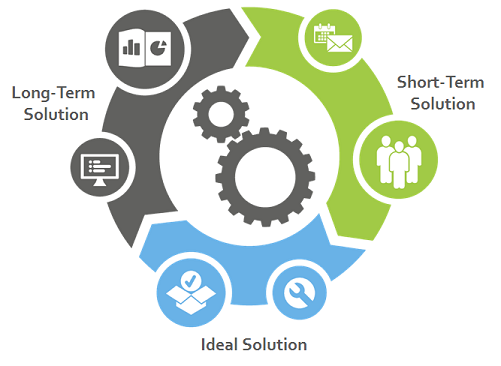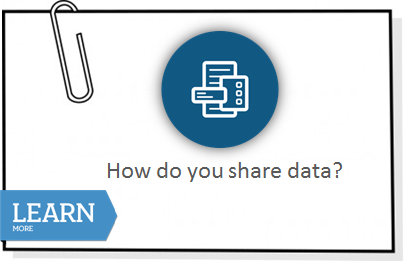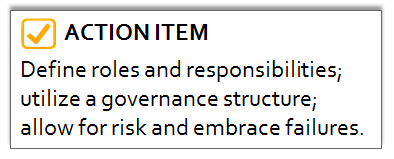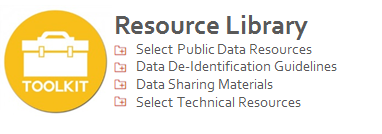DATA PLAYBOOK California Health and Human Services Agency
3. Implement
Play 03. Implement: plan & strategy
This play will help Departments move from conversation to action. It will provide resources that will allow the Departments to succeed. This might include: roles and responsibilities; governance structures; and data standards.
This play includes resources on project management and change management to help both staff implement and leadership enforce the importance of this work.
This Play moves away from the theoretical and drives toward the tactical.
By detailing all critical steps before starting the project, the Department can anticipate factors they otherwise would not consider until encountered and identify potential problems and challenges on the front end.
The planning becomes proactive instead of reactive, which allows best practices to be used and ensures that energy and time are spent on implementing a high-quality, well‐thought‐out project rather than “putting out fires.”

The planning and implementation processes will allow any person working on the project, regardless of his or her level of involvement, to fully understand the goal of the project and how it is to be accomplished. It ensures that everyone working on the project is on the same page and that any discrepancies are resolved before they become costly to the project or population served.
This play includes various resources designed to help with project management and data management.

Departments will work to identify Data Sharing and Data De-Identification best practices and lessons learned.
The Project Management Resources will include resources on: agile planning and development; resource management; training; communication; and governance.
The Data Management Resources will include resources on: data access and publishing; data standards; data documentation; and data tools and analytics.
CHHS Data De-Identification
CHHS collects, manages and disseminates a wide range of data. As Departments classify data tables and catalog their publishable state data, they should be mindful of legal and policy restrictions on publication of certain kinds of data. The CHHS Data Subcommittee commissioned the development of Agency-wide guidelines to assist Departments in assessing data for public release.
The CHHS Data De-Identification Guidelines support CHHS governance goals to reduce inconsistency of practices across Departments, align standards used across Departments, facilitate the release of useful data to the public, promote transparency of state government, and support other CHHS initiatives, such as the CHHS Open Data Portal.
See the full guidelines in the Resource Library.
De-Identification Considerations:
- The CHHS Data De-Identification Guidelines are the default policy for CHHS departments. If a CHHS Department wants to customize the guidelines, it must have appropriate references to departmental processes and must file a copy of their guidelines with the Office of the Agency Information Office.
- While most state agencies are covered by the California Information Practices Act (IPA), some are also covered by or impacted by HIPAA, the United States Health Insurance Portability and Accountability Act. Unlike the IPA, which applies to all personal information, HIPAA only applies to certain health or healthcare-related information. HIPAA requirements apply in combination with IPA requirements.
- For Departments covered by HIPAA, de-identification must meet the HIPAA standard. The CHHS Data De-Identification Guidelines serve as a tool to make and document an expert determination consistent with the HIPAA standard.
CHHS Data Sharing
Data sharing at CHHS is governed by the CHHS Data Exchange Agreement. The CHHS Data Exchange Agreement is bifurcated into two parts—one master agreement with general legal boilerplate language and subordinate “Business Use Case Proposals” containing the specific business case to document each data exchange under the master agreement. The Business Use Case Proposal includes information such as data elements, intended use, etc. The master agreement, when coupled with the Business Use Case Proposal, forms the complete, standardized, legally-compliant data sharing agreement.
The goals of data sharing at CHHS are to:
- Establish a legal framework for data initiatives
- Maximize appropriate sharing to increase positive outcomes and customer service
- Ensure privacy and security protections
- Reduce risk and use of duplicative resources
- Standardize data use agreements among CHHS Departments and offices
- Reduce contracting and data use agreement redundancies
- Track activity for better understanding of common data sharing needs between CHHS departments
See the CHHS Data Exchange Agreement, Business Use Case Proposal, and related data sharing materials in the Resource Library.
Data Sharing Tips:
- The CHHS data sharing process encourages collaboration between departments. Start by requesting a meeting with the data provider to talk through your business use case. You will likely find the data provider has important insights about the data you are requesting.
- The CHHS data sharing process requires data providers to work with the Departmental Data Coordinator in the development of a Business Use Case Proposal. Data coordinators will help programs refine Business Use Case Proposals so that they can be successful. If the two parties cannot come to agreement, the data coordinators will assist in taking the request to the Risk Management Subcommittee to help moderate the dispute.
- The CHHS Data Exchange Agreement and associated resources govern intra-agency data sharing between CHHS departments. Considering using these resources as templates for data sharing agreements with California government agencies, local governments, and universities as well.

